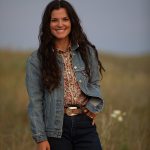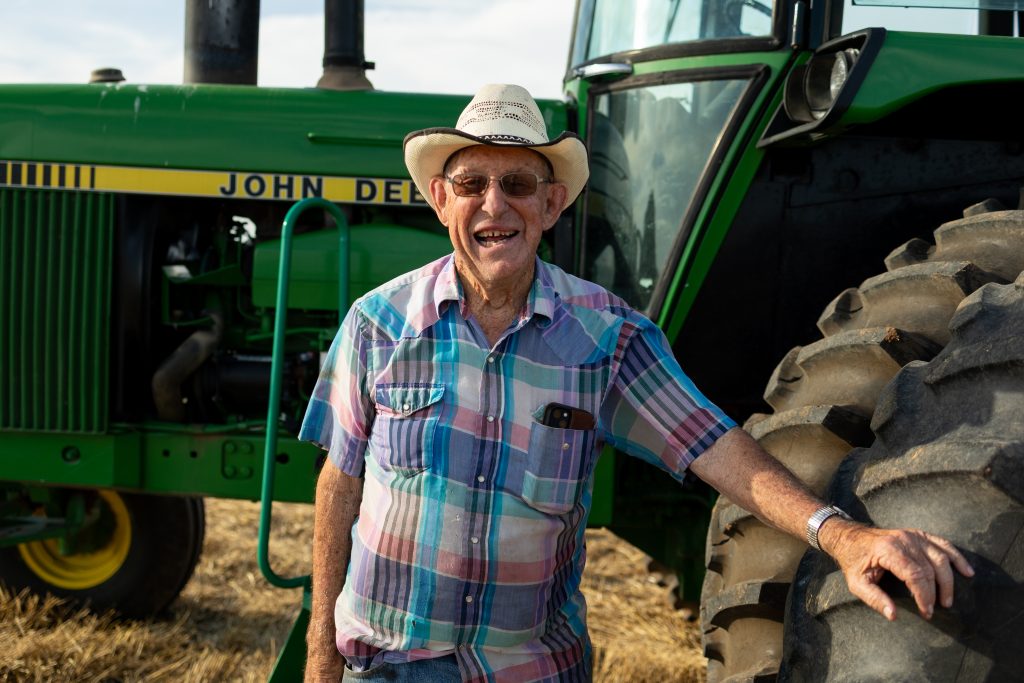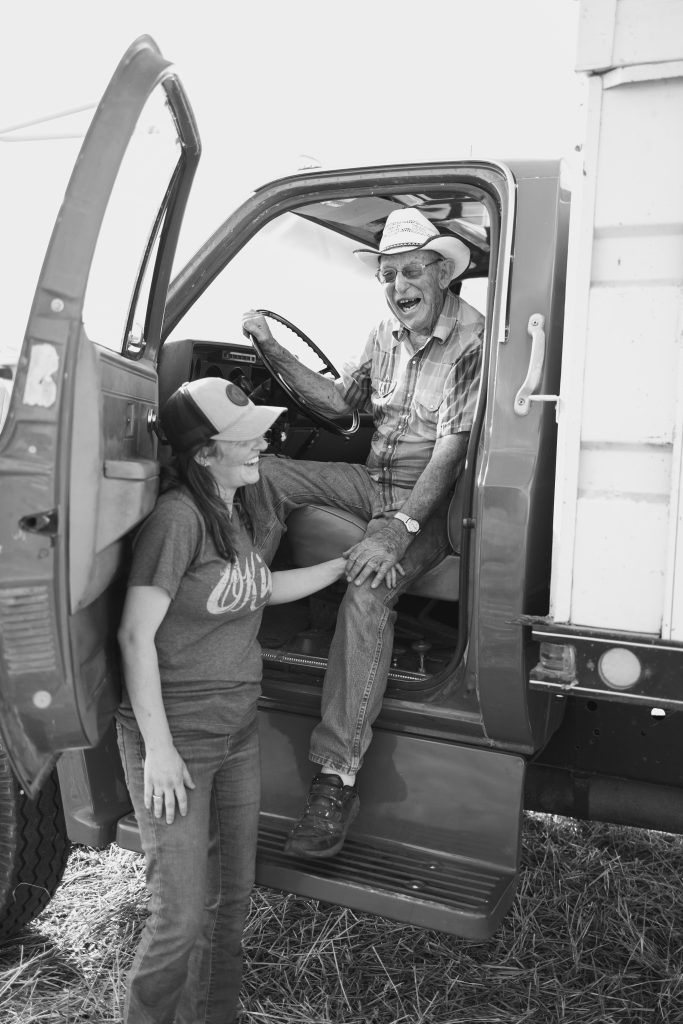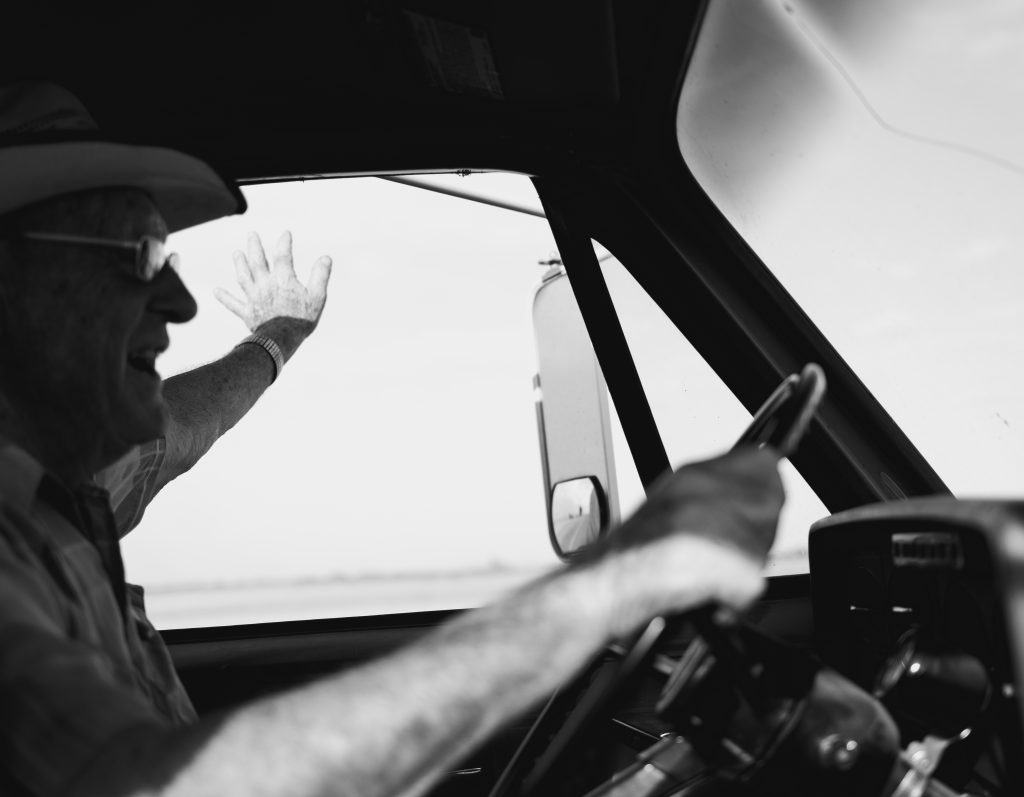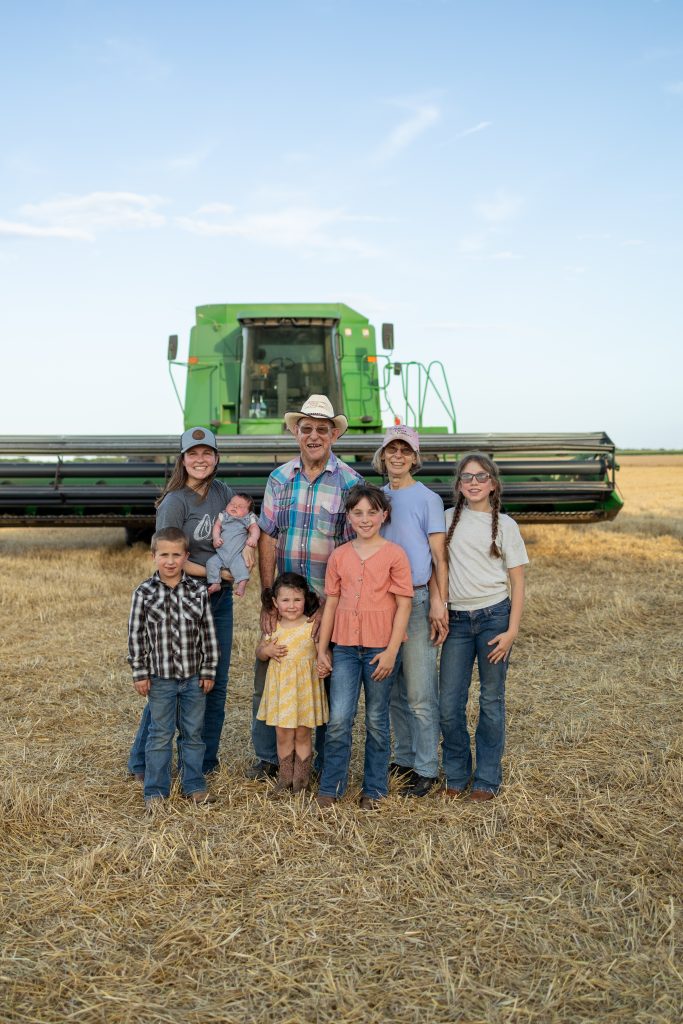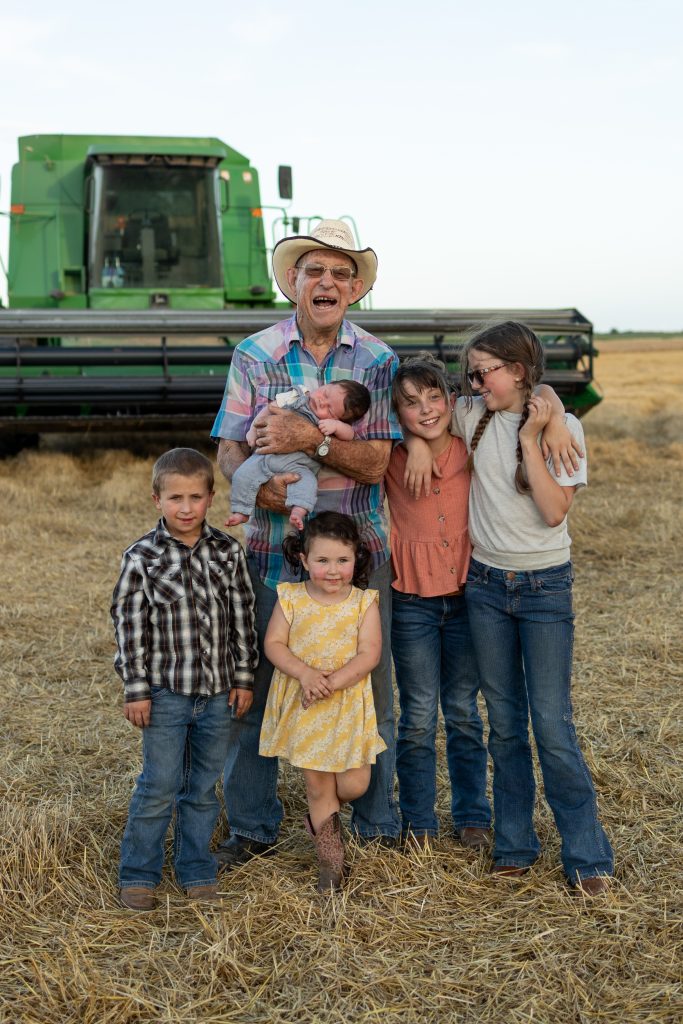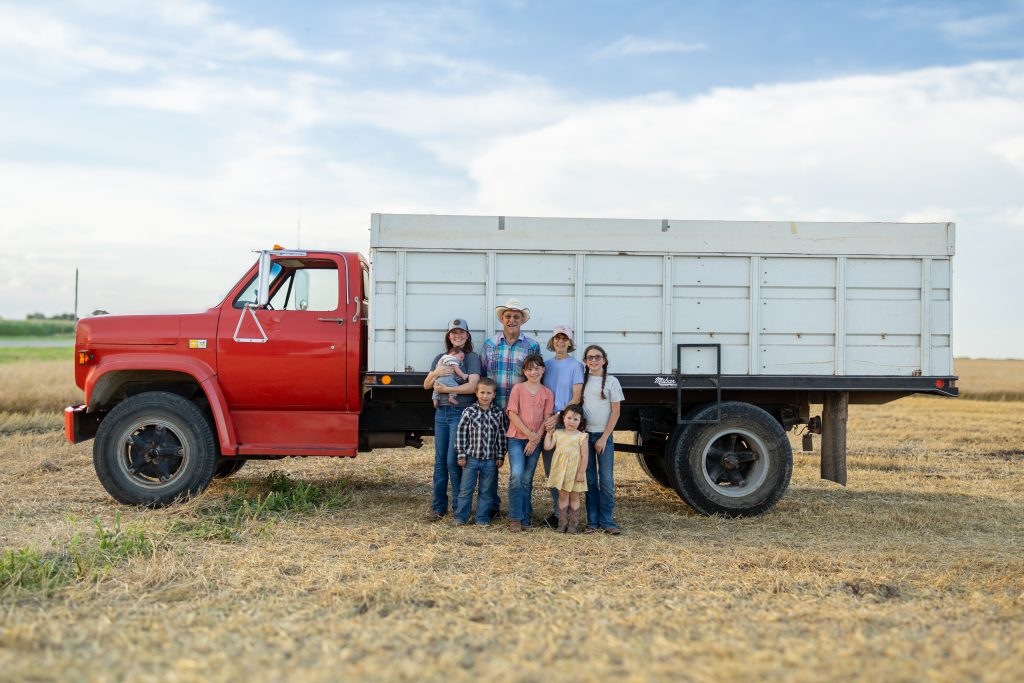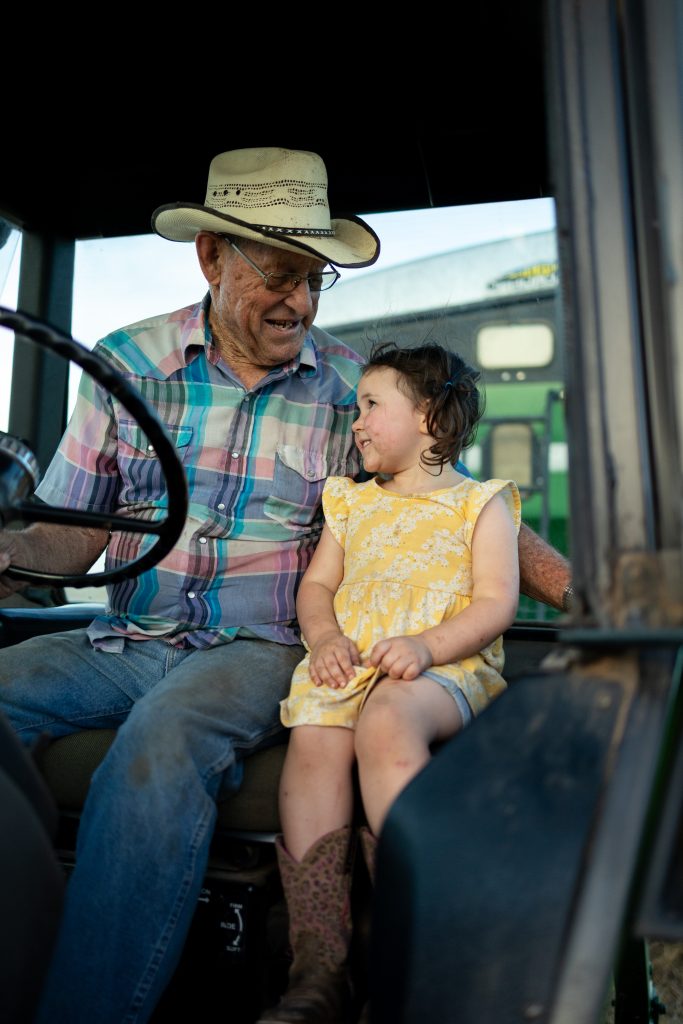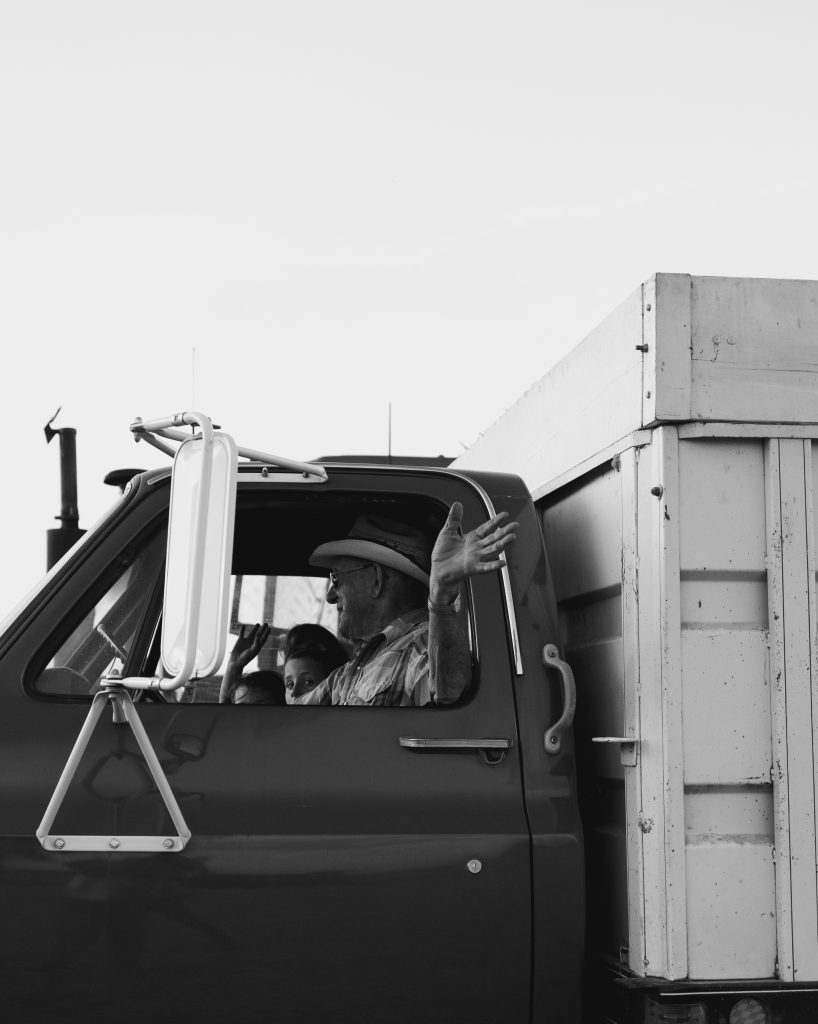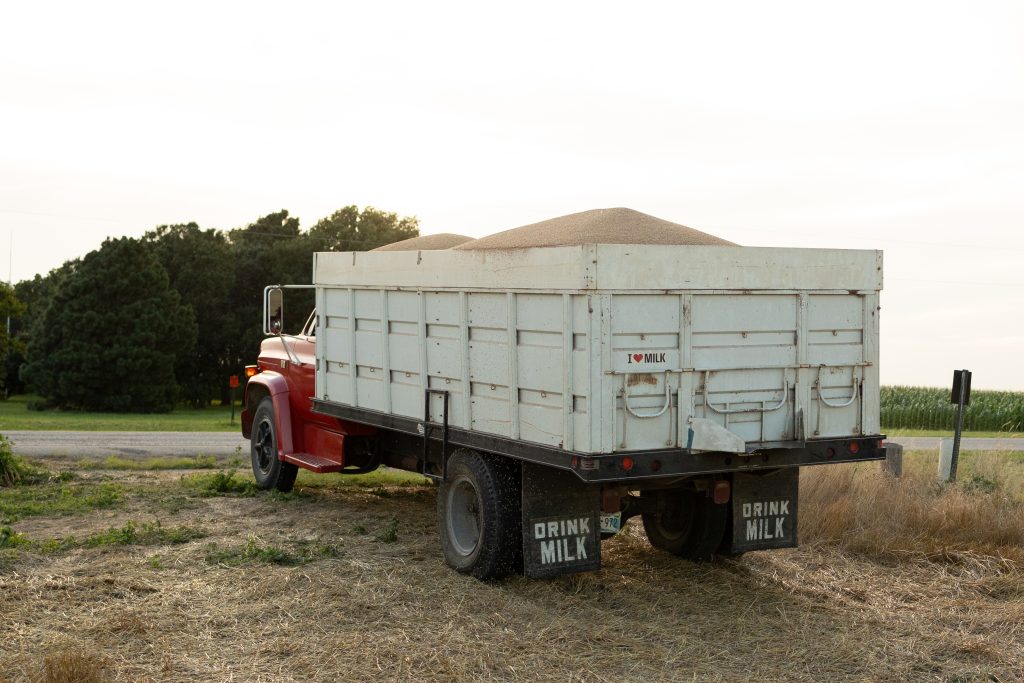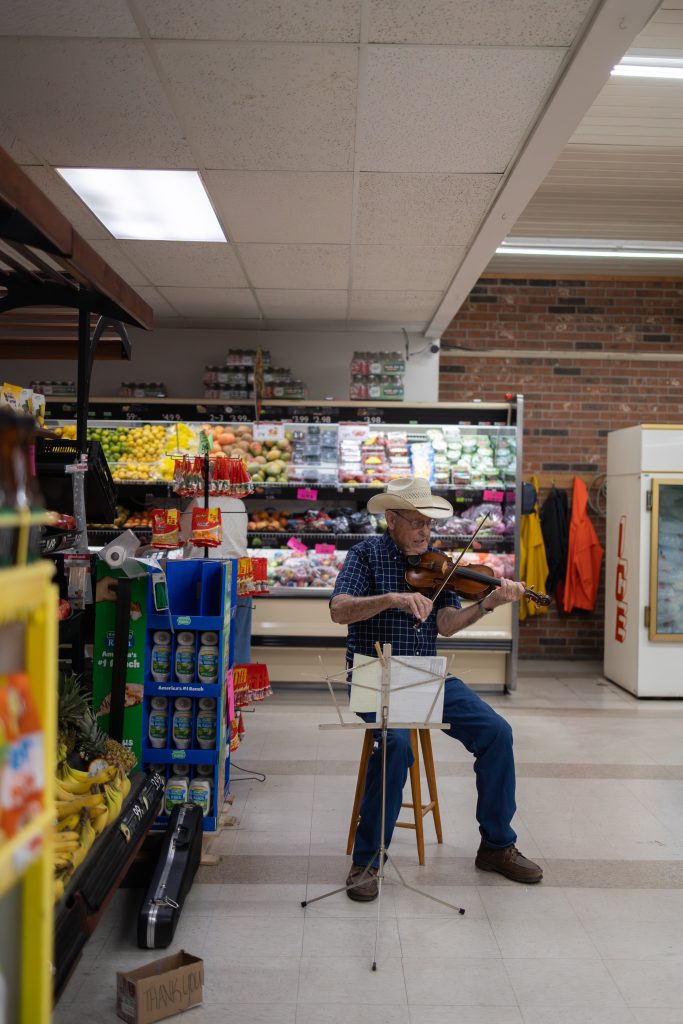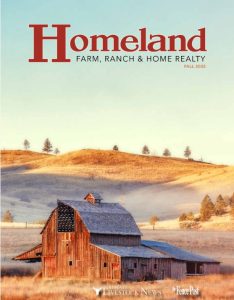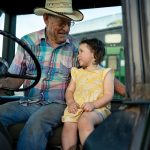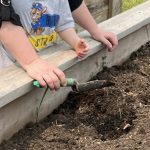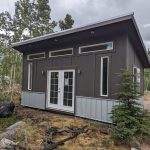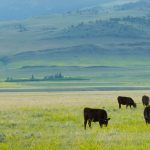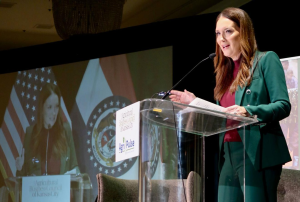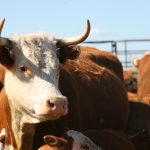2025 Fall Homeland | The Last Wheat Harvest
Glenn Webster’s Farming Legacy
He invited me to haul a load of wheat with him to town. Call it his retirement party but after 70 years of harvesting, it was the last. I climbed into his old red truck that still reads ‘Drink Milk’ on the mud flaps. A truck that gave him a start in his younger years as a dairy operator now carries his last load of wheat to the local elevator. Bittersweet is the moment. So, I hopped in with Mr. Webster. We talked about the long harvest seasons of the past, the market, trusting God with it all, and when he found Jesus at the age of 14.
Glenn Webster grew up in Northern Oklahoma near the small town of Lamont. This year marked 70 years of harvesting wheat. He attributes the success of his wheat farming to the good Lord; and it wasn’t just prayer that he leaned on. He took risks and held onto his faith when times got tough. Webster shares how, after his first year of harvest, he never again insured his crop – unheard of in today’s farming community.
“I never lost a crop. We had 80 acres up by Deer Creek (Oklahoma) that we farmed for my brother that got hailed pretty hard, but that’s all we ever lost in 70 years. Praise the Lord.”
His Start
Webster was the youngest of four boys. He denies being the favorite, but he did say, “Being the youngest, I learned fast.”
Webster married a girl he grew up with, Sybil Whitehead. “I was active in FFA and she was the FFA sweetheart. I got to marry the FFA sweetheart.” Webster remarks she stood 5’2″ but was strong for her size. “She could pick up a calf panel and carry a bucket of milk as good as anybody.”
When Webster got out of high school he began sheering sheep. “I sheared sheep for 15 years around the northern part of the country. And then we decided we ought to get in something a little easier so we got into the dairy business.”
Whether that was easier or not, he wasn’t sure, but he and Sybil did that for 30 years. They were married 62 and a half years before she passed away from cancer. “It’s the hardest thing you’ll ever do is bury your mate. But (my kids) lived right there by me. Still do. They were so good to me. Both still are so good to me.”
Faith
‘I accepted Christ when I was 14 in that little Methodist Church in Deer Creek. It’s still standing there. When they had the invitation at the end of service, I went forward and committed my life to Jesus and it was a great decision.”
“Through the years it was never ‘if’ we were going to church. Church was what our lives revolved around. We put our Christian life first. We never worked on Sunday, never cut wheat on Sunday.”
His great-grandfather Elijah helped build the first church in Lamont, Oklahoma, made of sod. Then in 1924, his great-grandfather helped build a wooden church for the community. Elijah was so involved that they called it the ‘Webster Chapel’. A few years later the community decided that they needed to move Webster Chapel to Deer Creek, Oklahoma. So, a few farmers got together and using poles and horses they got it picked up and moved it to Deer Creek. It still stands today.
“My parents were farmers, too. How my dad helped us boys get started was, as we graduated high school, he would give us 50 acres of wheat that he had planted in the fall that would be ready to harvest next June and allowed us to take ownership from there. That was the first and only crop Webster insured.
‘When I got mine, I insured it for hail and fire just to protect my crop, I wasted my money and I decided I wasn’t going to do that again. So these 70 years that I’ve raised wheat, I’ve never insured it. I just leave it to the Lord. I pray while I’m working the soil. And hail is a big detriment in this area for wheat in the spring – but I never lost a crop.”
During the years of running the dairy, Webster bought a farm west of Lamont that he planted for alfalfa every year for the dairy operation. The alfalfa field and the dairy were about five miles apart. Some friends of theirs lived near that alfalfa field and then they also had land near where Websters lived. So, one day Webster approached his friends and proposed they trade fields. Make it easier for everyone, allowing each family to farm close to their home places. So, they did. No money exchanged, just traded deeds.
“I’ve been successful in being a farmer. But I give God the glory. We tried to do it by the way I was taught by those before me.”
His Dad
Both of Websters’ parents grew up in Deer Creek, Oklahoma. They went to church at the Deer Creek Methodist Church. His dad never went to high school, but he took eighth grade twice. He just lived a mile and a half from the country school.
“He lived where my son lives now.”
“There were several kids in the territory, and they would meet and walk this mile and a half every day to school together. Dad wanted to learn to play the piano, and they didn’t have a piano, but his grandparents did. And they lived half a mile across the field from his house. So he would either ride a horse or walk to his grandparents and practice every day and sometimes up to four hours a day, he said, at their house. And he’d become a good piano player. Even when he was in his 90s, he could play some of the pieces by memory that he had learned as a child. He would enter some of the contests in piano playing and he could still play some of those songs.’
Webster was very close to his dad, who lived to be 90 years old.
“They never had a lot of money. Got married in the Depression in 1930. I can remember they had one new car in 1960. They scraped enough money to get a new Dodge Dart. Never had a new tractor. We farmed with horses, mostly. Dad had two old tractors when I was in high school and I loved it. Even if they were old and worn out, I just loved to be on the tractors. And he liked it too, but it was tough. I can remember we had a big barn. Big barn, and he would fill it. We raised alfalfa and used ropes to move it. You would lower it and had a big fork, big as this table, you dip down into the load of hay and then that big rope went up and back of the barn and down and out the door. And you put horses on that, and you pull on that rope and that would pull this big fork of hay. Then you’d pull another rope, trip the fork and dump it there.”
It was hard work, Webster said, but everyone liked it for the most part. When his dad got old enough, and all the boys were grown up and using his rented land, he changed paths and rented a filling station in Deer Creek Oklahoma. He pumped gas at Deer Creek to finish his years.
Webster remembers his dad saying, “I would’ve done this sooner if I’d have known it was much more fun than farming.” But Websters’ father farmed in a difficult era. He had hot steel wheel tractors that he always had to buy used. “Us boys were always working on something,” he said.
Webster remembers buying his first tractor, a brand-new John Deere, for $3,200. That was the first and last piece of equipment he purchased brand new. It took several years to pay that off, but it was worth the initial investment. “But my dad never had that opportunity,” Webster said. His dad taught him to achieve what you could through hard work.
Webster’s grandfather was also a successful farmer. He can remember him having several teams of horses in the barn and running two plows at the same time, four horses on a two-bottom plow. And he’d have two sets in the same field plowing. Webster says he learned a lot from him too.
Despite the times, Webster says he never saw his dad angry, another way his dad inspired him.
“If he was, he didn’t show it. I’m sure he was troubled at times trying to raise four boys on a farm. The night I went to sleep and wrecked the family car, he probably wasn’t too happy. But he didn’t show it.”
His Next Chapter
Webster would prefer to keep farming, but he knows the timing is right.
“No, but I don’t think I got an option [to retire]. I love to farm but arthritis is working on me too. I decided if I was going to enjoy my grandkids, I needed to quit the farming and spend more time with them. I’d like to get them hooked on the music a little more.”
Webster learned the fiddle from his dad, but he didn’t really pick it up until he was 30 or 40 years old. He now plays the fiddle every week at a nearby grocery store. He shares how it’s his ministry; it’s something little he can do to help others. Any tips he makes during his time playing in the store, he gives to the cashier to give to those who cannot afford groceries.
Sybil was a pianist. She was adamant that her children learn to play.
“Sue (their daughter) is a good piano player. Excellent. And Sybil taught her. She’d say, ‘you have a choice – you can either practice the piano or do the dishes.’ and she’d practice the piano.”
Happiness
The way Mr. Webster lives out his faith and prioritizes family, even as a farmer with a large workload, is inspiring to those around him. The beautiful family he finds himself surrounded by is a testament to his good investment. If you find yourself near Webster, you can feel his genuine joy, and it’s contagious.
“I’m very happy. I don’t know what I would change about my life. I had a wonderful wife, and good kids. I hope my family will always be true to God and the Bible.”
There’s no doubt what Webster cares about most. “My family. The farms mean nothing. I’m not a worrier. I learned: from my mistakes and moved on, and to do everything, with God’s help.”
Advice
Webster had a few things to say to the young generation:
“Not sure I have any answers but there’s no substitute for a personal relationship with Jesus Christ. If all else fails, we need that relationship. And it’s a personal thing. I can’t pass that onto my kids, but I can teach them the best I can. It’s a personal relationship.”
“Also, I think it’s the lack of prioritizing parental guidance in the home. Allowing so many other things to influence or diminish the role as a parent all together. 50 years ago, they would honor Wednesdays and Sundays, nowadays the schedule runs the show.”
“I never went in debt for new equipment. Only debt on land. Everything else was not necessary.”
“Stewardship enters in with success. Without stewardship you may not make it. But if you’re a good steward, God will provide. Being a good steward of the soil, and the people God has given you.”
“I think if the farmers don’t wake up, they won’t last. They are in debt up to their ears in new green machinery. And they’re going to be broke in 10 years. Good management, instead of new equipment.”
“Stewardship enters in with success. Without stewardship you may not make it. But if you’re a good steward, God will provide. Being a good steward of the soil, and the people God has given you.”
– Glenn Webster
